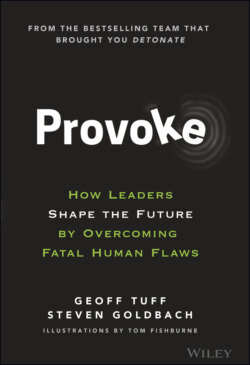Читать книгу Provoke - Geoff Tuff - Страница 6
INTRODUCTION
ОглавлениеKids love rollercoasters.
Not all kids, and not all rollercoasters … but by and large they just love them.
Although they exhibit patience for nothing else, they are willing to wait in a long line just to get a few minutes of thrill. They smile with glee as the car grinds and clacks up the track at a snail's pace, anticipating the hair-raising freefall that comes on the other side when all that potential energy is converted to kinetic. Many of them even put up their hands as the car moves from one phase to the next to increase the thrill level, testing the safety design of the harness that is keeping them inside. Not knowing precisely what's coming doesn't scare them. It excites them.
In adulthood, it's safe to say one's relationship with rollercoasters changes. There are some who still love them, but our (albeit unscientific) experience suggests it becomes a smaller and smaller proportion of the population as we age. For those who do not enjoy rollercoasters, the thrill is gone and the experience is quite literally the opposite of the glee of youth. Instead of eyes wide open, looking around at the world and what's to come, the eyes stay clamped shut in the hope that not seeing will make the experience less painful. Instead of testing the boundaries of the safety system by raising your arms, riders freeze in place, white-knuckling the safety bar, fingernails dug in, just praying for a return to stable ground. Instead of seeing what happens, these riders wish for a mental map of what's coming next and desperately hope that the whole thing will just end as quickly as possible.
The physical experience is the same – the feel of the car, the path of the track, and the centripetal force bolstered by redundant safety mechanisms. But the emotional reaction to the experience is fundamentally different.
The history of leadership is chock-full of people who look like both types of riders: those who embrace the ride and others whose fixation on each possible pitfall renders them immobile. Both groups, in past decades, have had a reliable foundation on which to “ride,” with predictable outcomes linked either to carefree confidence that everything is on a safe path or obsessive overanalysis of knowable details. But the plight of each archetype is complicated by the realities of today's environment, which are serving up increasingly unpredictable twists, crests, and dives.
Whether their bias has been to follow the momentum of past experience or to call for ever-increasing burdens of analytical proof, leaders will have a harder and harder time anticipating and capitalizing on the peaks. Yet it's at these peaks when new opportunities shift from the possibility of “if” to the inevitability of “when.” Past data and experience are proving less useful and, to make matters worse, most leaders (whether they know it or not) are forced to act with blinders on. Basic human cognitive biases – what we call “fatal flaws” – narrow individual and organizational peripheral vision and lead to all-too-typical dysfunction.
The best leaders rise above these constraints to gain perspective; they set aside their terror of the ride and summon their inner child, who can better deal with the twists and turns. They recognize – and even appreciate – that while they may not be able to control all the outcomes, they can plan for and control their reactions.
These days, the conviction to act – especially in the absence of perfect data – is the only way to provoke the future you desire. Action creates potential energy. Action allows you to position yourself to see the peak sooner and more clearly than others. Action gives you the power to move through the phase change of “if” to “when” so that you can make the most use of the kinetic energy when it's released.
And action, in an uncertain world, is increasingly the best way to learn. If you don't act with purpose, your once-thriving business could suddenly become a “wind-down” firm, operating on borrowed time.
Detonate, our previous book, was our call to selectively blow up the foundations of past success to allow for forward progress. Provoke is about looking forward and working through the natural human instincts that keep people frozen in place, thinking and analyzing. It is about forcefully gathering the will to act in the face of deepening uncertainty and DO SOMETHING!
